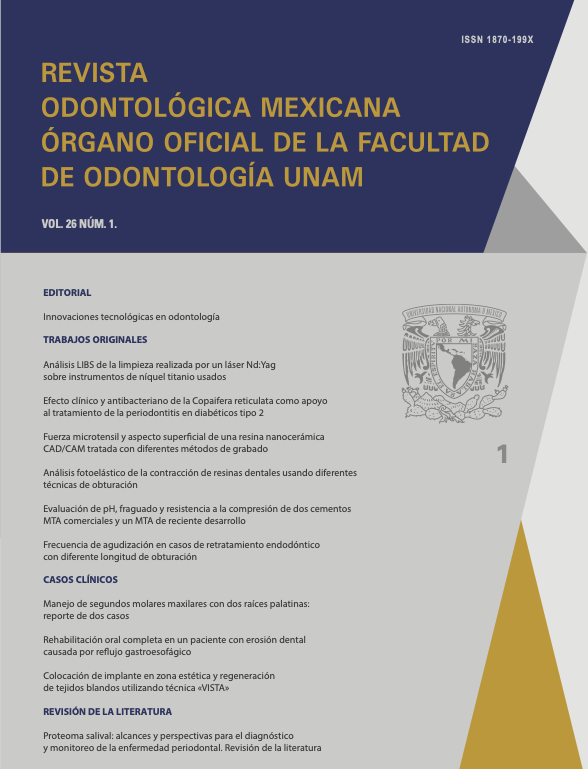Evaluation of pH, setting, and compressive strength of two commercial MTA cements and a newly developed MTA
Main Article Content
Abstract
The aim of this study was to evaluate the pH and compressive strength in relation to the setting time of three retrograde filling cements. MTA-Angelus® (MBA) and MTA Viarden® (MV) root sealing cements, the latter of Mexican origin, were used as controls for the experimental cement (EC). The tests to be carried out were SEM-EDS, X-ray diffraction, pH, setting time, and compressive strength at different hardening times (1 day, 7 days, and 28 days). The obtained results showed that the tricalcium silicate phase (Ca3SiO5) is present in all three cements, but with the absence of other phases and the presence of trace elements in MV. The highest pH values obtained 1 day after the onset of the reaction were shown by MV and EC. At 28 days, the pH of MBA and EC remained stable while MV remained below them. Something similar happened during the compressive strength test, where EC obtained the highest values at different hardening times (1 day-23.5 MPa, 7 days-36.5 MPa, and 28 days- 36.7 MPa) and the lowest was MV (1 day-14.7 MPa, 7 days-17 MPa and 28 days-19.5 MPa). Regarding setting time, EC registered the shortest time, and MV, the longest. MBA remained with intermediate values in all tests. It is hereby concluded that the low results shown by MV were due to the presence of trace elements and possibly to the low formation of portlandite and calcium silicate hydrate (CSH) in the MV. It should be noted that so far EC is a good candidate to compete with other commercial MTA cements.
Article Details
Citas en Dimensions Service

Revista Odontológica Mexicana por Universidad Nacional Autónoma de México se distribuye bajo una Licencia Creative Commons Atribución-NoComercial-SinDerivar 4.0 Internacional.
Basada en una obra en http://revistas.unam.mx/index.php/rom.
